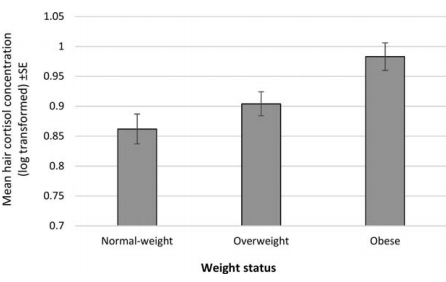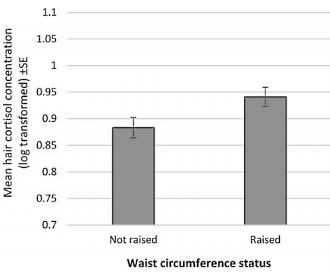Iron Game
Veteran
We don’t need to tell our regular readers that cortisol, the hormone that’s released when we’re under stress, can have a disastrous effect on your body. The epidemiological study that British researchers published in Obesity confirms this yet again. The Brits were able to show that a chronically raised cortisol level dramatically increases the chance of overweight.
Study
The researchers measured the BMI, waist circumference and cortisol concentration in the hair of 2,527 people over 50. They analysed 2-cm lengths of head hair. Because the hair on our heads grows 1 centimetre per month, these measurements provided a picture of the cortisol concentration in the bodies of the participants over the previous two months.
Results
There was more cortisol in the hair of the participants who were a couple of kilograms [Overweight] too heavy than in the hair of the participants who were a healthy weight [Normal-weight]. And they found even more cortisol in the participants who were dangerously overweight – those who had a BMI of over 30 [Obese].


The researchers observed a similar relationship between cortisol and waist circumference. The men had higher cortisol levels in their hair when their waist measurement was 102 cm or more. The women had more cortisol in their hair when their waist measurement was 88 cm or more.
The relationships between cortisol, overweight and a thick waist were statistically significant.
Mechanism
“Chronic stress – and thus chronically elevated levels of cortisol – may promote obesity through effects on fat accumulation,” the Brits wrote. “The effects of cortisol are mediated via glucocorticoid receptors, which have a particularly high density in visceral adipose tissue.”
Increased cortisol levels from chronic stress make you fat
“In the presence of insulin, cortisol promotes triglyceride accumulation and retention in visceral fat depots which results in increased abdominal fat. [Hum Reprod. 1997 Oct;12 Suppl 1:21-5.] Indeed, animal studies have shown that chronic exposure to physical and psychological stressors increases deposition of visceral fat. [Am J Primatol. 2009 Sep;71(9):742-51.] [Physiol Behav. 1992 Sep;52(3):583-90.]”

“In addition to influencing fat deposition, cortisol is associated with alterations in the quantity and type of foods consumed. Laboratory studies in humans have shown increased ad libitum caloric intake in response to glucocorticoid infusion and artificially induced stress. [Am J Physiol. 1996 Aug;271(2 Pt 1):E317-25.] [Psychoneuroendocrinology. 2001 Jan;26(1):37-49.]”
“In addition to absolute changes in energy intake, functional MRI studies have indicated that the sensitivity of central food reward circuits is lower during times of stress, which may increase cravings for ‘comfort foods’. [Int J Obes (Lond). 2010 Jan;34(1):172-81.] Under stress, there is a shift in preference toward more palatable, energy-dense foods irrespective of whether total energy intake increases. [Physiol Behav. 2006 Apr 15;87(4):789-93.] [Psychosom Med. 2000 Nov-Dec;62(6):853-65.]”
Conclusion
“These results provide consistent evidence that long-term exposure to elevated levels of cortisol over several months is associated with higher levels of adiposity,” the researchers concluded.
“Hair cortisol offers a suitable and easily obtainable measure for assessing chronically elevated cortisol concentrations in obesity research and may therefore aid in further advancing understanding in this area.”
“While cross-sectional studies have provided a good starting point from which to explore the role of hypothalamic-pituitary-adrenal axis dysregulation and chronic cortisol exposure in the development of obesity, longitudinal research is needed in order to clarify the direction of associations.”
[h=4]Hair cortisol and adiposity in a population-based sample of 2,527 men and women aged 54 to 87 years[/h]Abstract
Objective
Chronic cortisol exposure is hypothesized to contribute to obesity. This study examined associations between hair cortisol concentrations, a novel indicator of long-term cortisol exposure, and adiposity in a large population-based sample.
Methods
Data were from 2,527 men and women aged 54 and older (98% white British) participating in the English Longitudinal Study of Ageing. Hair cortisol concentrations were determined from the scalp-nearest 2 cm hair segment, and height, weight, and waist circumference were objectively measured. Covariates included age, sex, socioeconomic status, smoking status, diabetes, and arthritis.
Results
In cross-sectional analyses, hair cortisol concentrations were positively correlated with weight (r = 0.102, P < 0.001), BMI (r = 0.101, P < 0.001), and waist circumference (r = 0.082, P = 0.001) and were significantly elevated in participants with obesity (BMI ≥30 kg/m2) (F = 6.58, P = 0.001) and raised waist circumference (≥102 cm in men, ≥88 cm in women) (F = 4.87, P = 0.027). Hair cortisol levels were also positively associated with the persistence of obesity (F = 12.70, P < 0.001), evaluated in retrospect over 4 years. Conclusions Chronic exposure to elevated cortisol concentrations, assessed in hair, is associated with markers of adiposity and with the persistence of obesity over time. Source: http://onlinelibrary.wiley.com/doi/...ionid=0DEE85D4E888DC7605755A34FABE7012.f02t03
Study
The researchers measured the BMI, waist circumference and cortisol concentration in the hair of 2,527 people over 50. They analysed 2-cm lengths of head hair. Because the hair on our heads grows 1 centimetre per month, these measurements provided a picture of the cortisol concentration in the bodies of the participants over the previous two months.
Results
There was more cortisol in the hair of the participants who were a couple of kilograms [Overweight] too heavy than in the hair of the participants who were a healthy weight [Normal-weight]. And they found even more cortisol in the participants who were dangerously overweight – those who had a BMI of over 30 [Obese].


The researchers observed a similar relationship between cortisol and waist circumference. The men had higher cortisol levels in their hair when their waist measurement was 102 cm or more. The women had more cortisol in their hair when their waist measurement was 88 cm or more.
The relationships between cortisol, overweight and a thick waist were statistically significant.
Mechanism
“Chronic stress – and thus chronically elevated levels of cortisol – may promote obesity through effects on fat accumulation,” the Brits wrote. “The effects of cortisol are mediated via glucocorticoid receptors, which have a particularly high density in visceral adipose tissue.”
Increased cortisol levels from chronic stress make you fat
“In the presence of insulin, cortisol promotes triglyceride accumulation and retention in visceral fat depots which results in increased abdominal fat. [Hum Reprod. 1997 Oct;12 Suppl 1:21-5.] Indeed, animal studies have shown that chronic exposure to physical and psychological stressors increases deposition of visceral fat. [Am J Primatol. 2009 Sep;71(9):742-51.] [Physiol Behav. 1992 Sep;52(3):583-90.]”

“In addition to influencing fat deposition, cortisol is associated with alterations in the quantity and type of foods consumed. Laboratory studies in humans have shown increased ad libitum caloric intake in response to glucocorticoid infusion and artificially induced stress. [Am J Physiol. 1996 Aug;271(2 Pt 1):E317-25.] [Psychoneuroendocrinology. 2001 Jan;26(1):37-49.]”
“In addition to absolute changes in energy intake, functional MRI studies have indicated that the sensitivity of central food reward circuits is lower during times of stress, which may increase cravings for ‘comfort foods’. [Int J Obes (Lond). 2010 Jan;34(1):172-81.] Under stress, there is a shift in preference toward more palatable, energy-dense foods irrespective of whether total energy intake increases. [Physiol Behav. 2006 Apr 15;87(4):789-93.] [Psychosom Med. 2000 Nov-Dec;62(6):853-65.]”
Conclusion
“These results provide consistent evidence that long-term exposure to elevated levels of cortisol over several months is associated with higher levels of adiposity,” the researchers concluded.
“Hair cortisol offers a suitable and easily obtainable measure for assessing chronically elevated cortisol concentrations in obesity research and may therefore aid in further advancing understanding in this area.”
“While cross-sectional studies have provided a good starting point from which to explore the role of hypothalamic-pituitary-adrenal axis dysregulation and chronic cortisol exposure in the development of obesity, longitudinal research is needed in order to clarify the direction of associations.”
[h=4]Hair cortisol and adiposity in a population-based sample of 2,527 men and women aged 54 to 87 years[/h]Abstract
Objective
Chronic cortisol exposure is hypothesized to contribute to obesity. This study examined associations between hair cortisol concentrations, a novel indicator of long-term cortisol exposure, and adiposity in a large population-based sample.
Methods
Data were from 2,527 men and women aged 54 and older (98% white British) participating in the English Longitudinal Study of Ageing. Hair cortisol concentrations were determined from the scalp-nearest 2 cm hair segment, and height, weight, and waist circumference were objectively measured. Covariates included age, sex, socioeconomic status, smoking status, diabetes, and arthritis.
Results
In cross-sectional analyses, hair cortisol concentrations were positively correlated with weight (r = 0.102, P < 0.001), BMI (r = 0.101, P < 0.001), and waist circumference (r = 0.082, P = 0.001) and were significantly elevated in participants with obesity (BMI ≥30 kg/m2) (F = 6.58, P = 0.001) and raised waist circumference (≥102 cm in men, ≥88 cm in women) (F = 4.87, P = 0.027). Hair cortisol levels were also positively associated with the persistence of obesity (F = 12.70, P < 0.001), evaluated in retrospect over 4 years. Conclusions Chronic exposure to elevated cortisol concentrations, assessed in hair, is associated with markers of adiposity and with the persistence of obesity over time. Source: http://onlinelibrary.wiley.com/doi/...ionid=0DEE85D4E888DC7605755A34FABE7012.f02t03

